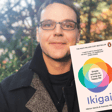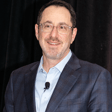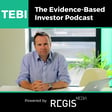Become a Creator today!Start creating today - Share your story with the world!
Start for free
00:00:00
00:00:01

Ep 21: Stephanie Griffiths on going from active manager to indexing advocate
After quitting her job in active management, Stephanie Griffiths started researching the academic evidence on investing and active fund management and concluded that, from a personal point of view, despite her experience and expertise, she was better off putting almost all her money in low-cost index funds.
She has since become a financial educator and has just written a book, Sit Still and Prosper, which shows people how to have a successful investment experience with the minimum of fuss, effort and worry.
The interview offers a fascinating into how active fund managers actually think, and it’s well worth listening to. Here are some of the highlights:
Transcript
Introduction to Tebbe Podcast
00:00:04
Speaker
Hello and welcome to the latest Tebbe podcast brought to you by Regis Media. If you're interested in evidence-based investing and how the financial industry really works, you've come to the right place.
Stephanie's Career Journey
00:00:18
Speaker
Our guest on this episode is Stephanie Griffiths, a former active fund manager from Toronto who has just written an interesting new book called Sit Still and Prosper.
00:00:31
Speaker
We're going to talk about that in a moment. But first, Stephanie, welcome to the Temi podcast. Oh, thank you very much for inviting me, Robin. It's a long story because I understand you were actually in the fund industry for about 20 years. You ran your own fund for 15 years of that time. Briefly, tell me about your your career. Well, I started out in journalism school.
00:00:59
Speaker
And partway through, I had a baby and I started looking for a career where I could afford daycare in Toronto. And I got into the financial services industry through sort of business journalism. And I started out at a small brokerage or small cap brokerage firm. So I was fascinated with smaller companies and that led to managing this fund. And it was extremely research based.
00:01:25
Speaker
So I found that my journalism background was a real competitive advantage. Interesting, right, okay. So you come from the same background as me then. It's a lucrative industry, let's face it, the fund management industry. You had a high status and presumably a pretty well-paid job.
Reasons for Leaving the Industry
00:01:46
Speaker
Why did you decide to leave? Well, I had a lot of help in my decision-making because the firm that I was working for
00:01:55
Speaker
I did a big reorganization and they changed the mandate of the fund slightly. And for me, I had a real kind of fixation on my style where I was very inflexible and I saw there was only one way to do things. And so I, you know, I left the firm. So, you know, and part of it too was as I was contemplating leaving,
00:02:24
Speaker
I realized I hadn't really done anything. The whole time I was managing the fund, it is absorbed all my time. I really didn't have a life. And as you say, I mean, there's a lot of prestige and, and, uh, you know, wealth associated with, with the industry. And, and for me, I realized I sort of traded off a lot of things and without really being aware of it. And that was my choice. I mean, you don't have to be a workaholic.
00:02:51
Speaker
but I find it in that career, it's very difficult not to be kind of focusing on your front 24-7. Quite. And in the introduction to the book, you describe a rather humbling experience a few years ago when a friend of yours emailed you for investment advice.
Investment Advice Complexities
00:03:10
Speaker
Perhaps you could explain to our listeners who haven't read the book, what happened. Okay, so this is a friend of mine who's in the, he's a screenwriter in Hollywood.
00:03:21
Speaker
And he's not interested in investing, but he realized that he needed to talk to his advisor. He wasn't happy with, you know, how his, his investments were doing. And he asked me, you know, well, what should I do? And I started drafting this email and it was like, well, you know, first of all, you have to decide how you feel about interest rates and bonds and how much equity exposure you want. And then you have to find, you know, you have to do this research.
00:03:46
Speaker
And I mean, it just got ridiculous. And I started thinking, well, this is, this is too complicated, right? You know, it was all about, you know, well, you have to do this, but you have to, you know, make sure you're, how you know how your advisor's paid. And I thought, you know, there has to be a simpler answer than this. That was a real eye opener for me because I'd always just put all my own money in my fund. I mean, I had my retirement savings in my fund and my children's educational savings in my fund.
00:04:14
Speaker
And I had people say, Oh, you know, that's so risky. And I said, well, you know, I know exactly what it is. That's what I do out there is managing this fund. And then, you know, helping my friend, I realized like, how does, how does the average consumer, I mean, there are thousands and thousands of funds and thousands and thousands of other investments. How is somebody who's not even really that interested investing supposed to make a wise decision? And he knew, like he knew that his advisor was not the right one for him.
00:04:41
Speaker
And I think that's something a lot of
Challenges in Financial Advisory
00:04:44
Speaker
people face. I mean, they suspect that there may be issues there, and then they don't have the background to look into it.
00:04:54
Speaker
It does seem very extraordinary, Stephanie, that somebody like yourself who was a successful financial professional, even you struggled to actually explain in simple terms what ordinary investors should do. It's therefore especially hard for ordinary investors to work this out on their own.
00:05:14
Speaker
Right. I mean, when I started looking into it, I mean, what, what occurred to me right off the bat was, well, he really needed good advice. And I had, at that point, I had taken my own money out of the fund that I was no longer managing. And I started looking at, you know, well, where would I get advice? And, and then of course I came up against, you know, something that I'd read about and it hadn't really registered is that, you know, a lot of advisors have a very high minimum.
00:05:43
Speaker
So and then the next thing is, even if you find an advisor that you'd like to go with, then you know, in a lot of cases, you know, you're handing off a big percentage of your assets to this person, you know, based on maybe their track record and their reputation and so forth. And I think that it's that's a really difficult thing to do. And the way people make decisions, I mean, this is another thing that comes up in the book, the way people make decisions,
00:06:07
Speaker
A lot of times they're not aware of why they're making the decision. And there's a lot of behavioral bias that creeps in that people aren't necessarily aware of. They don't realize how different advisors get paid. They don't realize the idea of a fiduciary standard. A lot of people haven't heard about that. And I think that the media are doing a really good job right now telling people
00:06:34
Speaker
I mean, here there's a lot of discussion about having a, you know, a basic minimum education standard, but I think across North America in most places, you know, anyone can call themselves a financial advisor.
Skill vs Luck in Fund Management
00:06:45
Speaker
Stephanie, as both you and I know, very, very few funds actually do outperform the market on a risk and cost-adjusted basis over the long term without going into details. Your fund was actually very successful. In the book, though, you question whether that was down to luck or skill. And obviously, we all like to attribute our success to skill, don't we? And I'm assuming now that fund managers are no exception to that.
00:07:14
Speaker
Yeah, totally. Like, I mean, that was one of the things that, you know, meditation really taught me is I had this very strong feeling that the reason that my find was so successful was because my strategy was so superior and my research was so superior. But in reality, there has to be an aspect of luck. And I read somewhere and I don't remember the numbers, how much data you actually need to determine, you know, with certainty that somebody's skillful.
00:07:44
Speaker
And one advantage I had was that I had a very long track record, and a lot of funds don't have that length of track record.
00:07:51
Speaker
There is a study in the UK that looked into that very subject. And it's by David Blake and his colleagues at the Penton Institute in London. And they found that it takes 22 years to have 90% certainty that a manager has or doesn't have skill. So you're right. It's a long time.
00:08:18
Speaker
We'll talk about more about active management in a moment.
Speculation vs Investing
00:08:21
Speaker
First, you say in the book that whether we admit it or not, human beings are by nature creatures of the casino, to use your phrase. What do you mean by that, Stephanie? Well, that idea that we're really attracted by a lottery like payoff. I mean, people, I talked to one person who is
00:08:42
Speaker
absolutely, you know, evidence-based in his heart. And he admitted to me that when he sees something in his inbox, you know, promising an exciting investment opportunity, I mean, he has that feeling. I mean, your heart kind of is tugged by that idea that I'm going to buy this, you know, there's this unique opportunity. And if I put some money behind this, I'm going to, you know, I'm going to, you know, get rich. I mean, that idea of get rich. I mean, you know, when people write advertising, how exciting the word free is to people.
00:09:12
Speaker
I mean, there is an emotional aspect to investing that I feel people often don't recognise. I was talking to an Australian advisor the other day, and he was telling me about the Melbourne Cup, their big horse race event every year. And he says, literally, that day, or the run-up to that day,
00:09:39
Speaker
everyone in Melbourne suddenly becomes an expert on horses, even though for the rest of the year, they would say they don't know anything about horse racing at all. And I suppose you could say it's a similar story with investing. Yeah, I mean, I think that's true. I mean, you look at all these different kinds of fads that come up where, you know, everybody's talking about Bitcoin or marijuana stocks or any of these things. And it is, you know, that attraction of the get rich quick scheme.
00:10:09
Speaker
I mean, and I think people have to be aware of that because a lot of times what happens is you create all these rationalizations why this is actually, you know, a legitimate investment. And one of the big themes of my book is that, you know, unless you do, you're doing a lot of research and you're reading the prospectus and you really know what you're doing, you're a speculator. You're not an investor. And that's just, that's just a fact. I mean, that goes back to like Ben Graham and you know, people say they're going to invest in marijuana stocks and they don't necessarily know anything about, you know,
00:10:38
Speaker
the regulation or the competitive situation. I mean, the same with Bitcoin. I mean, a lot of people, they buy Bitcoin and they consider it an investment and they don't even understand how it works.
Choosing Index Funds
00:10:51
Speaker
So although you were an active fund manager for many years, you decided to invest most of your money in low-cost index funds. Why was that? After I left the industry, I thought, well, I considered managing money on my own.
00:11:07
Speaker
And my first thought was, you know, I was at a huge disadvantage that I didn't have the same information resources, you know, as an individual versus a professional. I just, I didn't have the meetings. I didn't have Bloomberg. So I thought I'm at a huge disadvantage here. And so then I thought, well, you know, I could buy a fund. And then I started looking at other people's funds and feeling like I don't have the real insight into, you know, I'm not going to know if this person is planning to quit next week.
00:11:37
Speaker
Yeah, I don't know. I mean, I saw I actually saw some research where they said that hedge funds underperform when the manager either falls in love or gets divorced. So you know, I'm thinking there's a lot of stuff going on here that I cannot do the research into. I know the data about the costs. So I mean, I had that feeling like I'm not sure like who am I going to trust with my own money. And then I started looking at ETFs, which really I had
00:12:06
Speaker
you know, I've been really absorbed in my, in my own work for so long and ETFs. I'd never really heard of them when I started out. And when I started looking at all these different ETFs, I got very interested in, you know, sort of factor investing and more, you know, evidence based ETFs and that sort of thing. So, you know, when when I went with my own money, I mean, I think that's really
00:12:31
Speaker
That's really a litmus test. What do people do with their own money, right? Exactly right. Exactly right. And in the book, you describe a visit to the Bogleheads Conference. Now, I've been to one myself, but perhaps you should explain to our listeners what being at a Bogleheads Conference is like. And for a start, who are the Bogleheads?
Bogleheads Community
00:12:53
Speaker
So, the Bogleheads are this grassroots fan club of Jack Bogle, the founder of
00:13:01
Speaker
Vanguard, which was the first index fund company. And it's just been phenomenal how that company has grown. And initially, when he started out, I mean, he got a lot of flack, you know, for, you know, offering people exposure to just the index. And, you know, he was accused of being un-American, because they weren't, you know, chasing above average performance. And these Bogleheads, I mean, you know, they're
00:13:29
Speaker
They're devoted to him because their financial success is in response to believing in that story and in his leadership in that area.
00:13:41
Speaker
So from your experience of working in the active fund industry for nearly 20 years, what do active managers really think about index funds? I mean, I hear, for example, that a lot of active fund managers actually invest their own money in index funds. You were talking about the importance of having skin in the game, if you like,
00:14:05
Speaker
you know, where you put your own money as a fund manager. But what do fund managers really make of index funds? You know, I have to say that, you know, after I left the industry, when I had more time, I started reading a lot of the research on active management and, you know, how, I mean, there's research that says towards the end of the year, portfolio managers that are ahead tend to lock in and ones that are behind tend to start, you know, trying to do something quickly to fix their performance. And I read a lot of this research
00:14:35
Speaker
But you know, I have to say in my experience, most of the money managers that I know really believe in what they're doing. I mean, you know, I, I know people that they have strategies that scare me and they totally believe in them and they do have their own money. I mean, you know, I know because I was in the small cap area, I would know people that would manage small cap funds that were much more speculative in nature, like especially because I'm in Canada,
00:15:02
Speaker
I mean, I had a colleague that ran a fund that owned a lot of junior mining stocks and he was always telling me, you know, you really should, you know, you really should look at some of my holdings because they would really be good for your fund. So, you know, most people I know.
00:15:15
Speaker
really believe strongly in what they're doing. But they must see this evidence. They must see the SPIVA data from S&P Dow Jones coming out every six months and the Morningstar Active Passive Barometer and so on. They must see this educational research from Chicago Business School and so on that keeps coming out and saying the same thing, that it's very, very, very rare that a manager will outperform. And it's almost impossible to actually spot one in advance.
00:15:44
Speaker
Yes. And it's hilarious. Because what I find is that and you know, I was I'm I was very guilty of this myself, is that it's always the other guy, right? Like my strategy is a legitimate strategy. And, you know, when I have a bad year, I'm gonna say, Oh, you know, the market was against my strategy. I don't know. I mean, I don't think there's a high level of self awareness.
00:16:12
Speaker
that it's possibly you know that the element like I mean you just said yourself I mean the data that you need to definitively say that somebody's good at that job you need 20 years of data I mean how many fund managers have 20 years of data and you have to have a very high degree of confidence to do that job because you know you get I mean the market gives you feedback every single day so if you're
00:16:39
Speaker
insecure about what you're doing, you're just going to be jumping all over the place. So you have to have a high level of conviction.
00:16:45
Speaker
So you've talked about the active managers themselves. What about fund house executives who've got to answer to their shareholders? We keep hearing that they're concerned about the growth of indexing and Canada, as you know, has some of the highest active fund fees in the world. And I'm guessing then that Bay Street is especially nervous about the outflows from active and inter-passive funds.
00:17:13
Speaker
Well, I feel that it's very, very healthy. I mean, one of the things, you know, one of the themes of the book is that it is, I mean, none of these things exist in a vacuum. So I think what happens longer term and what we're seeing here now is that, you know, big fund companies are getting interested in ETFs. They're getting interested in factor investing. You know, they're, they're developing products that have a lower fee base and
00:17:39
Speaker
I think that there's the really talented people on the active side. There'll just be fewer, more talented people. That's how I see the future. I don't believe that these big companies are just going to sit there with thousands and thousands of funds. I really see it. I think that it's very healthy and that the consumers benefit. That was another big theme of the book. A lot of this evolution that's going on does benefit.
The 'Sit Still' Investment Approach
00:18:09
Speaker
consumer because the fees will come down and there'll be more options. So of course a very big part of your philosophy as well as using low cost funds is the importance of sitting still. Hence the title of your book and also not trading and not worrying about the financial markets. Tell me about that. So my job was really was about worrying and I worried pretty much 24 seven. I worried about every single stock I owned.
00:18:39
Speaker
And I think that's important if you're an active manager, but as a human being and as a consumer, that's very unhealthy. I mean, ideally you invest your money. And I think that's, you know, the Bogle heads, you know, there's a fantastic group of people, but the idea that, you know, they've put their money there and Jack Bogle talks about too, you know, putting your money away and not looking at it because what happens when you start looking at it is that you start thinking, well, I should do something.
00:19:08
Speaker
And as you know, the more people trade, typically, what they're doing is they're destroying value and a lot of the research. I mean, it's interesting because, I mean, I don't know if you've seen the research on, you know, there's some research that came out a few years ago that said, you know, women are better investors. And when you look at the research, what it really said was that women trade less. And, you know, if you trade less, you tend to have better results. But it's that human tendency to think I should do something. And when people do something most commonly,
00:19:39
Speaker
is in a downturn. So a lot of times, the more activity there is, the less performance there is.
Meditation and Investing
00:19:48
Speaker
You mentioned that you were a warrior, and you talk in the book about the value to you of meditation. Tell me about that and how that fits in with the sit, still, and prosper approach. I worried a lot, and yeah, I am a warrior.
00:20:09
Speaker
And one of the benefits of meditation is the clarity of, well, what's really important? And that was one of the things that really came clear to me was I loved my job. Like for years, I really loved my job. But when I stopped loving it, I didn't notice I was so, you know, I was so tied into that was such a big part of my identity. And I think, you know, similarly, people don't have a lot of clarity, like with finance,
00:20:37
Speaker
There's certain people, they don't even want to look at it because it's like, Oh no, you know, and they, you know, they'll spend more time researching their cell phone plan. And if you sit down and you're, you're very clear about what's really important to me, you know, you know, how comfortable am I with risk? You know, because a lot of times people think, Oh, you know, if only I had bought this or if only I had done that and you know, they're fighting the last war or they're,
00:21:06
Speaker
Making decisions. I mean, the big thing is, how are you making decisions? Are you making decisions in a reactive way where you're panicking? Or are you making decisions about, you know, what's really important here? Like, you know, with financial advice, it's things like, you know, is this person a fiduciary? How much does this advice cost and things like that, rather than
00:21:25
Speaker
you meet your neighbor over the fence and he tells you how he made all this money in this stock and you rush back to the house because you can't get in there quickly enough. There's a very good analogy really there isn't there between sit still and prosper style investing, doing nothing and meditating, which is effectively
Maintaining the 'Sit Still' Mindset
00:21:45
Speaker
doing nothing and emptying your mind, if you like. Both of those things seem as though they should be really easy, but actually, and I talk as someone who's tried to learn meditation myself, not with huge success in recent months, it's actually very difficult.
00:22:05
Speaker
Yeah, I mean, it's very difficult. I mean, look at, you know, look at what happens in a market downturn. How many people swore that they had a high risk tolerance? Suddenly they don't, right? It's very hard not to react because you're human because you have emotion. It's the same, you know, sitting still with your mind. I mean, you know, I mean, you know, Warren Buffett always says it's it's simple, but it's not easy.
00:22:29
Speaker
Exactly. I've got one final question to ask and if I may play devil's advocate here a little Stephanie. You as you say had a well-paid job in inactive management and you were actually probably in a better position than most two
00:22:48
Speaker
you know, go and enjoy life and relax more and not have to work so hard. But I suppose even for investors of modest means, this kind of do nothing, sit still approach to investing, it can still be very liberating, can't it? It just frees up time and saves you from stressing as well.
00:23:13
Speaker
I mean, I just think it's a question too of how you wish to spend your time. I mean, I know people that love chasing after some little investment idea and it's really enjoyable to them, but I think there's a lot of people who are, the way that I am now is they don't really want to worry about it. So, you know, putting, like, I mean, there are all these solutions like index plans, robo advisors, you know, there's factor ETFs, there's different strategies where you, you know, you just, you don't have to worry about it.
00:23:44
Speaker
You know, if you enjoy picking small cap stocks, great, spend all your time on it, but it's really very difficult. And I mean, that's the bottom line for me is that if you're a real investor,
00:23:55
Speaker
it's going to take all your time. If you're really doing the research and you're really investing, it's going to take a lot of your time. And if you're a consumer, you're competing with professionals who are doing it 24 seven. Exactly right. Thank you so much, Stephanie. Just a quick round of please about the book and where people can
Conclusion and Book Promotion
00:24:12
Speaker
buy it. So the book's available. Um, I think almost anywhere that books are sold online, um, Amazon book depository, and it's available also as an ebook.
00:24:24
Speaker
Okay. And it's called sit still and prosper by Stephanie Griffiths. Well, Stephanie, thank you so much for joining us today. It's been a fascinating discussion. Um, and that brings us to the end of this episode of the Tebbe podcast brought to you by Regis Media, a bespoke provider of content and social media management to financial advice and planning firms around the world.
00:24:48
Speaker
For more information about Regis Media just visit the website regismedia.com. You've been listening to Stephanie Griffiths talking about her book Sit Still and Prosper. Please do comment on what Stephanie's had to say whether you agree with her or not and please if you've enjoyed this discussion why not write a review.
00:25:09
Speaker
Finally, if you haven't subscribed to the podcast, please do so. We're on both SoundCloud and iTunes. Thank you again to Stephanie Griffiths, and most of all, to you for listening. From me, Robin Powell, and our producer, James Cresswell, goodbye.
















